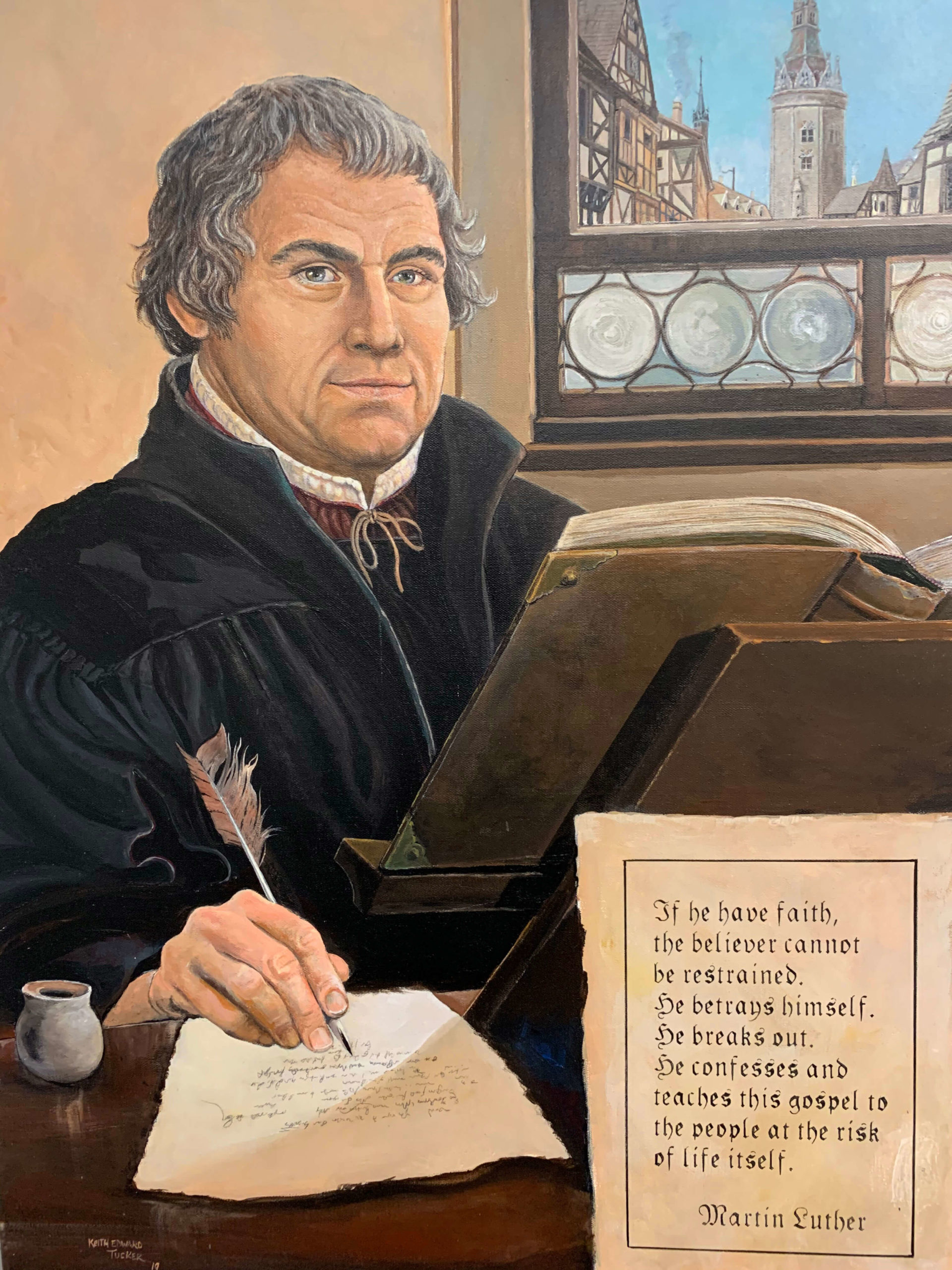Martin Luther
1483 – 1546
The great German Reformer, Martin Luther, was born November 10, 1483, in Eisleben, Saxony, and died there February 18, 1546. He was the second son of Hans Luther, a miner of Thuringian peasant stock. Martin studied at the University of Erfurt and received his Master of Arts degree in 1505. Following his father’s desire, he began pursuing the law profession. However, traveling on foot from Mansfeld to Erfurt, he was surprised by a lightning bolt which struck him to the ground. He cried out, “St. Anna, help me, and I will become a monk.” Luther later regretted the oath but felt bound to it. He entered the monastic order and became extremely ascetic to gain proper relationship with God.
In 1507, Luther was ordained a priest and began his work as a theological teacher, rising in academic rank. In 1508 he became a teacher at the University of Wittenberg. Luther obtained a doctorate of theology on October 19, 1512, and shortly thereafter became Staupitz’ successor on the theological faculty as professor of Biblical theology.
Luther was plagued with an inner demand for true righteousness, something he could not attain through penance, monasticism, or the sacraments. Exegeting a passage in Romans 1:17, he discovered what he regarded as the true meaning of the Gospel. This permeated his teachings, and he became increasingly critical of Catholic theology, based on Aristotelian principles. In 1515 Luther became the priest of the City Church of Wittenberg. After much prayer, he tacked to the door of the Schlosskirche (Castle Church) in Wittenberg the ninety-five academic theses “on the power of indulgences.” The point of those theses (the archbishop had given ninety-four commending indulgences) was that if indulgences were payments to be received as “good works” as a release from the temporal punishments of God, from the pains of purgatory, or from guilt, they were contrary to Christianity, which allows the believer to practice repentance throughout his whole life. Controversy developed, and he was denounced in Rome. Johann Eck became his chief opponent and charged Luther with heretical hostility to the Pope.
Luther defended himself brilliantly at a disputation at the general chapter of the Saxon Augustinians in Heidelberg, April 26, 1518. Through the influence of Archduke Frederick and the University of Wittenberg, Luther’s case was brought before Cardinal Cajetan at Augsburg instead of in Rome. Cajetan, angered that Luther would not recant, sought his arrest as a heretic. Cajetan claimed the Pope’s permission, which he did not have. Political conditions kept the warrant from being issued, and Frederick protected Luther.
In 1520 Luther published a number of works which explained his position and built his popularity among theologians, clergymen, humanists, and the common people. Three of these are: Open Letter to the Christian Nobility of the German Nation Concerning the Reform of the Christian Estate; On the Babylonian Captivity of the Church; and On Christian Liberty. On December 10, 1520, Luther dramatically severed himself from obedience to the Pope by publicly burning a copy of the papal bulletin.
Luther was summoned to appear before the German Congress at Worms in 1521 to answer charges of heresy. Using the witness stand as a pulpit, Luther made his well-known defense. It is said (though possibly an interpolation) that he dramatically concluded with, “Here I stand! I cannot do otherwise! God help me!” He was promptly excommunicated from the Catholic Church.
Luther was safely conducted by friends to Wartburg Castle so that the Edict of Worms (a death warrant) was never executed.
Luther compiled a Small Catechism and a Large Catechism in 1529. These summarize his interpretation of the Christian Gospel and communicated the characteristic features of his faith to numerous generations of Lutherans. His commentaries on Galatians and Genesis became famous. His main work was furthering the Reformation, and he spent some twenty years translating the New Testament into German.
His last years were filled with pain resulting from digestive trouble. Luther had an extremely productive mind. He firmly established in Europe the three great truths of the New Testament which had been buried for centuries under ritual and dead formality: (1) Man is justified by faith alone. (2) Every believer is a priest with direct access to God through the Lord Jesus Christ. (3) The Bible apart from tradition is the sole source of faith and authority for the Christian.

